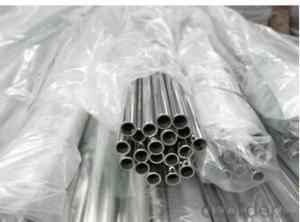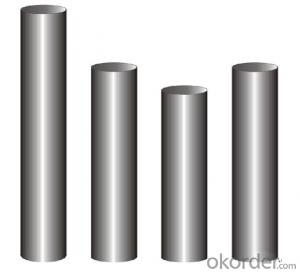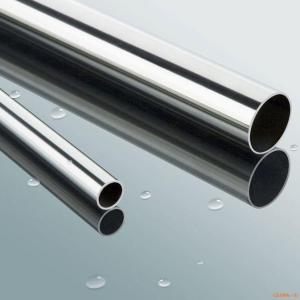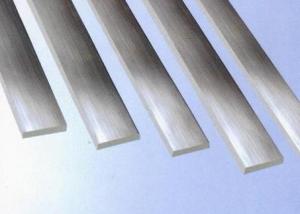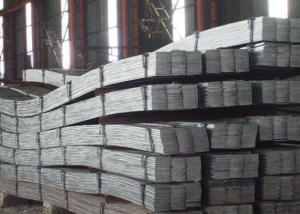Sanitary Stainless Steel Tube for food 3A
- Loading Port:
- China Main Port
- Payment Terms:
- TT OR LC
- Min Order Qty:
- -
- Supply Capability:
- -
OKorder Service Pledge
OKorder Financial Service
You Might Also Like
Specifications
1. Cold Rolled 304 &316L Material2. Highest degree of purity and cleanliness
3. For Dairy, Food, Beverage, and Other Sanitary
Product Name: 3A Sanitary Stainless Steel Tube for food
Materials
304L & 316L available with order.
Introduction
For Dairy, Food, Beverage, and Other Sanitary Applications.
Associated Tube’s sanitary tube is ideal for the dairy, food and beverage industries where the highest degree of purity and cleanliness is essential.
It is certified to the requirements of ASTM A270, 3A standards and most user specifications. Tubing is manufactured from the finest quality raw materials made exclusively to Associated Tube melt parameters.
Customers have come to rely on the quality of our sanitary tube products as well as our uncompromised commitment to total customer satisfaction.
Annealing
Hydrogen bright annealed in line to 1900°F (1040° C) minimum and rapidly quenched.
Surface Finishes
Surface finish is 20 µ-in Ra (0.5 µm) ID maximum, 30 µ-in Ra (0.8 µm) OD maximum surface roughness measured per ASME/ANSI B46.1 with the profilometer reading at 90 degrees to the lay. Other finishes available upon request.
Packaging
As a final step to ensure purity standards, each tube is packaged using 2 mil poly sleeving and both ends are sealed using air tight end caps. Tubes are packaged in protective tri-wall boxing. When specified, wood boxes and all export requirements can be provided.
Marking
Bright annealed tubing is line–stenciled with OD, wall, ASTM specifications, size, grade, heat number, production date and time. OD polished tube is marked on one end of each tube with a removable label stating ASTM specification, manufacturer, grade and heat number. Continuous line stencil available on request.
- Q:What are the common standards for stainless steel pipes?
- The common standards for stainless steel pipes vary depending on the specific application and industry. However, there are several widely recognized standards that are commonly used in the manufacturing and specification of stainless steel pipes. One of the most widely used standards is ASTM International, which sets the standards for various materials, including stainless steel. ASTM A312/A312M is the standard specification for seamless, welded, and heavily cold worked austenitic stainless steel pipes. This standard covers a wide range of pipe sizes and grades, including TP304, TP316, TP321, and more. Another commonly referenced standard is the American National Standards Institute (ANSI) standards. ANSI B36.19 specifies the dimensions, tolerances, and materials for stainless steel pipes. This standard covers both seamless and welded stainless steel pipes and includes a range of sizes and schedules. In addition to these standards, there are also specific standards for certain industries. For example, the American Petroleum Institute (API) has standards such as API 5L for line pipes used in the oil and gas industry. These standards outline the requirements for materials, dimensions, and testing for stainless steel pipes used in specific applications. Other standards organizations, such as the International Organization for Standardization (ISO) and the European Committee for Standardization (EN), also provide standards for stainless steel pipes. ISO 1127, for example, specifies the dimensions and tolerances for stainless steel pipes used in general purposes. It is important to note that these standards are continuously updated and revised based on technological advancements and industry needs. Therefore, it is crucial to consult the latest versions of these standards to ensure compliance and quality in the manufacturing and use of stainless steel pipes.
- Q:Can stainless steel pipes be coated with other materials?
- Coating stainless steel pipes with different materials is indeed possible. It is a widely adopted practice across diverse industries. The aim behind this coating procedure is to elevate their performance, safeguard against corrosion, enhance visual appeal, or provide supplementary functionalities. Epoxy, polyethylene, PVC, zinc, or ceramic coatings are some of the commonly employed materials for coating stainless steel pipes. These coatings offer numerous advantages, including heightened resistance to corrosion, improved resistance against abrasion, enhanced insulation properties, or diminished friction. The process of coating stainless steel pipes with other materials is typically carried out through techniques like electroplating, hot-dipping, or powder coating. The selection of the coating material and process hinges upon the specific requirements and intended application of the stainless steel pipes.
- Q:Are stainless steel pipes suitable for industrial applications?
- Yes, stainless steel pipes are highly suitable for industrial applications. Stainless steel is known for its excellent corrosion resistance, making it a preferred choice for various industries such as chemical, petrochemical, oil and gas, pharmaceutical, food and beverage, and many others. Stainless steel pipes can withstand high temperatures and pressures, making them ideal for transporting fluids and gases in industrial processes. They are also durable, strong, and have a long lifespan, which is crucial for heavy-duty industrial applications. Additionally, stainless steel pipes are easy to maintain and clean, reducing the risk of contamination in industries that require strict hygiene standards. Overall, stainless steel pipes offer numerous advantages that make them highly suitable and widely used in industrial applications.
- Q:Can stainless steel pipes be used for chemical processing plants?
- Yes, stainless steel pipes can be used for chemical processing plants. Stainless steel is a popular choice for various industrial applications, including chemical processing, due to its excellent corrosion resistance properties. Chemical processing plants deal with various corrosive substances, such as acids, alkalis, and solvents, which can cause damage to ordinary steel pipes. However, stainless steel pipes are highly resistant to corrosion, making them suitable for handling aggressive chemicals and ensuring the safety and reliability of the plant. Additionally, stainless steel pipes can withstand high temperatures, pressure, and mechanical stresses, making them a durable and long-lasting choice for chemical processing plants.
- Q:Do stainless steel pipes require any special coatings?
- Stainless steel pipes, being resistant to corrosion and staining, are highly durable and long-lasting. Their inherent corrosion resistance eliminates the need for extra coatings or treatments. The presence of chromium in the alloy composition creates a protective oxide layer on the surface, preventing rust and corrosion. As a result, stainless steel pipes can be used in various applications without the necessity of special coatings for protection.
- Q:Can stainless steel pipes be annealed?
- Yes, stainless steel pipes can be annealed. Annealing is a heat treatment process that involves heating the stainless steel pipes to a specific temperature and then cooling them slowly to alleviate stress, improve ductility, and enhance the material's mechanical properties. During the annealing process, the stainless steel pipes are heated to a temperature above their recrystallization temperature, typically between 1040°C and 1120°C (1904°F and 2048°F) for austenitic stainless steels. This allows the internal structure of the pipes to become more uniform and relieve any stresses that may have been induced during manufacturing or previous use. After annealing, the stainless steel pipes will have improved formability, increased toughness, and reduced hardness, making them suitable for various applications in industries such as oil and gas, chemical processing, and construction.
- Q:Are stainless steel pipes resistant to chlorine corrosion?
- Yes, stainless steel pipes are generally resistant to chlorine corrosion. Stainless steel is known for its excellent corrosion resistance, and it is particularly resistant to the corrosive effects of chlorine and chlorinated water. This is due to the high levels of chromium present in stainless steel, which forms a protective oxide layer on the surface of the metal. This oxide layer acts as a barrier between the stainless steel and the corrosive elements, preventing the chlorine from corroding the pipe. However, it is worth noting that the resistance of stainless steel pipes to chlorine corrosion can vary depending on the specific grade of stainless steel used. Therefore, it is important to select the appropriate grade of stainless steel that is specifically designed for resistance to chlorine corrosion when using stainless steel pipes in applications involving chlorinated water or chlorine-containing environments.
- Q:How do you prevent oxidation in stainless steel pipes?
- One way to prevent oxidation in stainless steel pipes is by applying a protective coating or paint that acts as a barrier against oxygen and moisture. Additionally, regular cleaning and maintenance can help remove any corrosive substances or deposits that could lead to oxidation.
- Q:Can stainless steel pipes be used for structural purposes?
- Yes, stainless steel pipes can be used for structural purposes. Stainless steel is known for its strength, durability, and resistance to corrosion, making it an excellent material for structural applications. Stainless steel pipes are commonly used in various industries such as construction, architecture, and engineering for structural support, as well as for conveying fluids and gases. They can withstand heavy loads, extreme temperatures, and harsh environmental conditions, making them suitable for a wide range of structural applications. Additionally, stainless steel pipes are available in different grades, sizes, and thicknesses, allowing for customization to meet specific structural requirements.
- Q:Can stainless steel pipes be used for oil and gas transportation?
- Yes, stainless steel pipes can be used for oil and gas transportation. Stainless steel is highly resistant to corrosion and can withstand high pressures and extreme temperatures, making it suitable for transporting oil and gas safely and efficiently.
1. Manufacturer Overview |
|
|---|---|
| Location | |
| Year Established | |
| Annual Output Value | |
| Main Markets | |
| Company Certifications | |
2. Manufacturer Certificates |
|
|---|---|
| a) Certification Name | |
| Range | |
| Reference | |
| Validity Period | |
3. Manufacturer Capability |
|
|---|---|
| a)Trade Capacity | |
| Nearest Port | |
| Export Percentage | |
| No.of Employees in Trade Department | |
| Language Spoken: | |
| b)Factory Information | |
| Factory Size: | |
| No. of Production Lines | |
| Contract Manufacturing | |
| Product Price Range | |
Send your message to us
Sanitary Stainless Steel Tube for food 3A
- Loading Port:
- China Main Port
- Payment Terms:
- TT OR LC
- Min Order Qty:
- -
- Supply Capability:
- -
OKorder Service Pledge
OKorder Financial Service
Similar products
New products
Hot products
Hot Searches
Related keywords
